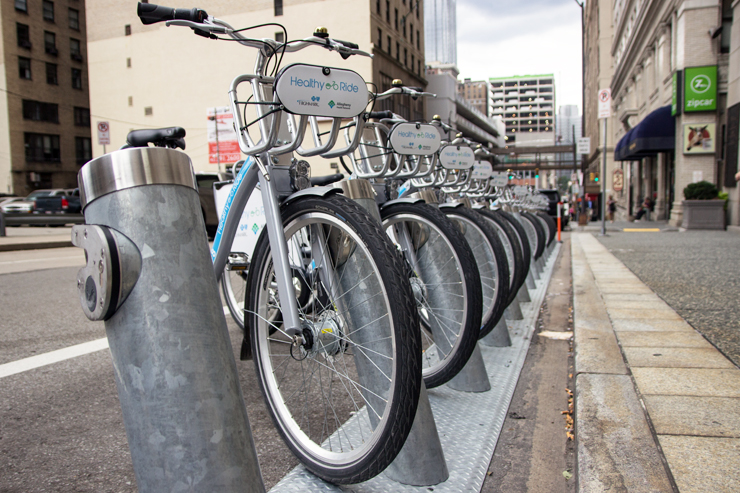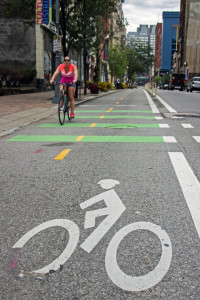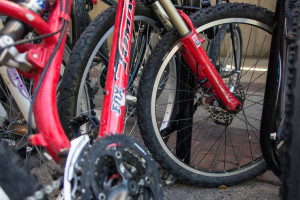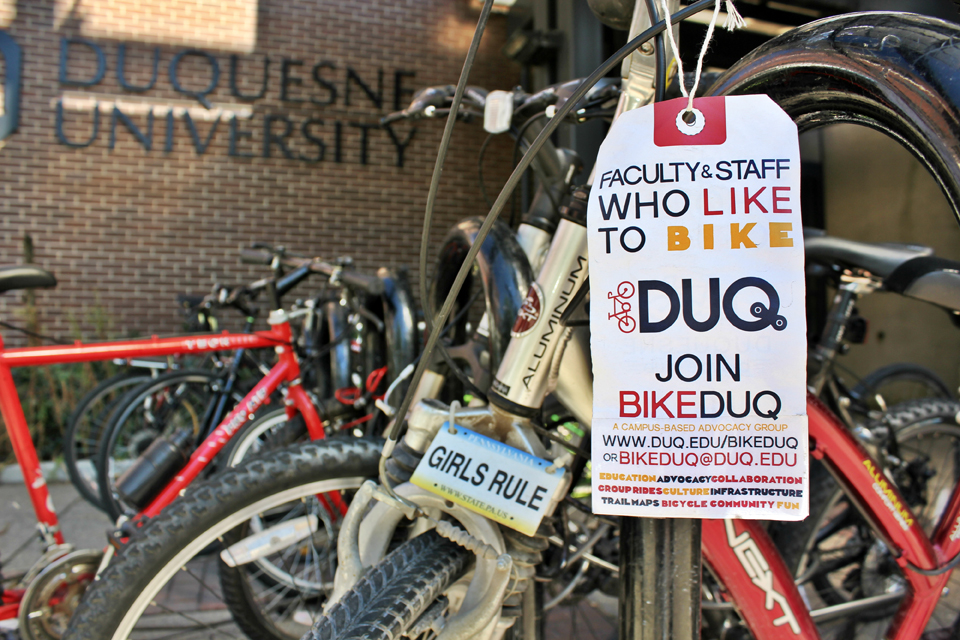

By Seth Culp-Ressler | Features Editor
With bikers swarming the streets for this week’s BikeFest – Pittsburgh’s grand celebration of all things pedal-powered – it’s never been more apparent that the Steel City is growing rapidly as a cyclist-welcoming metropolis.
Bike PGH, the city’s bike-focused nonprofit, organizes BikeFest, which runs for ten days – from this past Friday to next Sunday. The week and a half is ultimately a time for the Pittsburgh biking community to come together and celebrate the two-wheeled lifestyle.
Mike Carroll, Bike PGH’s Event Manager, said the goal of BikeFest is to provide a diverse range of activities and events for cyclists of all levels to take part in.
“The programming consists of some really imaginative, fun cycling and bicycle related topics,” Carroll said. “It can be everything from riding to breakfast and meeting up with people and having a cup of coffee to a forum to discuss the future of electronic bicycles, all the way to the largest bike ride in the region, Pedal Pittsburgh.”
Pedal Pittsburgh – the capstone for the week of BikeFest – will see thousands of cyclists taking to the streets and hills of the Pittsburgh area this coming Sunday. A massive event, it’s one that in many ways reflects the growing bike scene in the region.
Carroll said increased ridership is a definite trend in the area, and it can manifest itself in several ways.
“There are more and more people choosing to ride bikes for a variety of reasons this year than in previous years, we’ve seen really great growth in the city,” he said. “This includes recreational riders using rail-to-trails, going out for road races and the competitive side of cycling, mountain biking and then lots of people choosing bikes as transportation.”
There’s data to back up the claim as well. As the city’s Bicycle/Pedestrian Coordinator Kristin Saunders explained, census data for the past four years has shown a 408 percent increase in commuters cycling to work.
It’s important to note that this large jump is partly due to the small 2.3 percent of the population cycling, as it doesn’t take much to have huge increases in such a tiny group. That said, Saunders explained that The Department of City Planning is always trying to get more data to provide an accurate picture of the cycling climate.
“Something that the census data lacks is people who aren’t going to work,” she said, “Like retirees or people who are students who maybe don’t fill out the commute to work survey. And just people who cycle for reasons other than work, which might be a lot of people who drive to work and then cycle for the rest of their activities.”
One effort has been to manually count bikers and pedestrians in an area for two hours at a time, which provides a more representative picture of usage. Another route has taken place on the Penn Avenue bike lane, where sensors have been placed to count bikes as they roll by. Around 24,000 bikes were counted per month between May and July.

That Penn Avenue bike lane, besides providing valuable data, is also one of the key reasons more people are biking in the downtown area. Bike infrastructure, most notably bike lanes, is a vital aspect of building a strong cycling community. Pittsburgh, thanks in no small part to pushes made by Mayor Bill Peduto, is working hard to expand its offerings.
Saunders explained that a big part of the change has been Peduto’s Complete Streets Policy. The plan aims at creating streets that are “complete,” meaning they are designed to allow access for all users: pedestrians, cyclists, drivers and public transportation. The goal is to create roads that are safe and equitable for all who desire to utilize them.
“If developers want to come in and develop here we’ll have a policy that says this is how we build streets,” she said, “And these are the things you have to think about when designing the streets, and really be able to put forth what Pittsburgh cares about in our streets.”
Bike lanes are invaluable for providing bikers a safe way to navigate the downtown area, but what happens if someone doesn’t have a bike in the first place? Pittsburgh Bike Share’s Healthy Ride system, launched this past May, might be the answer. Now running at full capacity, Healthy Ride boasts 50 stations and 500 bikes citywide.
Erin Potts, Pittsburgh Bike Share’s director of marketing and community outreach, said bike shares are one of the true marks of a bike-friendly city, and provide yet another easy, fun and affordable transportation option for its residents.
Through the system’s app, “nextbike,” riders can pay as they go at $2 per 30 minutes, or sign up for monthly plans. On average, about 300 rides are being taken each day. The program even has some specific advantages for Duquesne students.
“Duquesne people love visiting the South Side, and we have some really great representation of stations over there,” Potts said. “So I was really happy to see there was some really great connectivity for Duquesne students in particular, because I know transportation-wise it’s a little bit different for Duquesne students. Cars are harder and harder to come by over there, parking certainly.”

Unfortunately, parking isn’t scarce on campus for just cars. David Lampe, a Duquesne biology professor, BikeDUQ member and Duquesne Bike Club faculty advisor, said that while Duquesne’s bike infrastructure is adequate, any kind of increased demand would overwhelm it quickly.
“There’s an indoor bike room with card access on the back of Des Places – that’s beautiful,” he said. “And there’s some indoor bike parking in one of the garages, but a lot of it is outside parking. And a lot of the bike racks and stuff that are on campus, I mean they look nice but they are not super functional. So we’ve been trying to work with facilities to improve that kind of thing.”
BikeDUQ, Duquesne’s cycling advocacy group, has been leading that charge, as well as generally encouraging students and faculty to consider biking to campus instead of using cars. The Bike Club will be hosting its own Bike Week the week of Sept. 14 in hopes of recruiting more individuals on campus to join the cycling life.
Of course, Lampe realizes that for new bikers, riding in a congested metropolitan area can be intimidating, so classes will soon be offered to help boost confidence in that area. Bike PGH also offers its own city riding classes, and of course Healthy Ride is a great way to get back on the saddle if a personal bike isn’t an option.
Really, though, the allure of biking is about the experience. As Carroll said, there’s not quite anything like it in terms of freedom. In many ways it’s a happy medium – not as limited as walking, yet not as isolating as driving.
“Stop, check out some cool public art,” Carroll said. “When you see a friend on the side of the road, ‘Oh hey!’ We’re going to take a second to get a cup of coffee. You can sort of make those decisions on the fly, which is really wonderful. But you also have that range that you now can explore.”
As a year-round bike commuter, Lampe explained how convenient it is to never have to deal with traffic, gas or parking. He doesn’t even have a parking pass. Cycling is beneficial physically, mentally and financially. For him, downsides are almost nonexistent.
“I like the predictability of it,” he said. “I like watching the seasons change along the rivers. I like riding with other people. There are all kinds of reasons to like it. I go for longer rides with a bike group I belong to. Western Pennsylvania is a really pretty place to ride once you’re acclimated to the hills. It’s just all good.”



